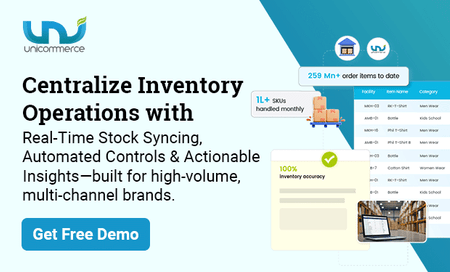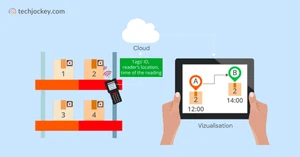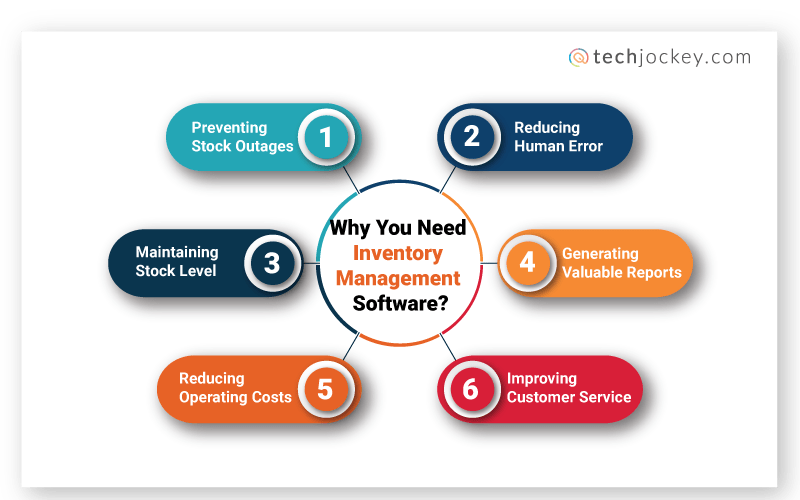What is Inventory Management Software?
Inventory management software is a computer program that tracks, manages, and shares reports on stock's level, sale, order, and purchase using a digital database. It includes recording incoming material information, online inventory cataloguing, periodic data entry for invoices and purchase orders. Inventory software also helps with physical counting of materials on hand, and quantities needed for production. The inventory tool allows users to calculate costs associated with the inventory and monitor performance metrics.
How Does Inventory Management Software Work?
Inventory management software is the most important element of a supply chain, and its main purpose is to track inventory levels, orders, product sales, and delivery status. The usage of this software automates the whole process, and it also drastically reduces human errors. It means you can use your resources and time to take care of tasks that need your urgent attention. Moreover, it provides some beneficial insights into ordering the right inventory at the right time and in the right quantities.
Stats Around Inventory Management Software Implementation
- 67% of warehouses want to use mobile devices to improve their inventory management workflow
- Using warehouse management software is essential to streamline the workflow, avoid errors & increase efficiency. Therefore 25% more retail business owners are purchasing new systems.
- Human error is the topmost problem in 46% of warehouses, and using an inventory management system can resolve this issue.
- In the past five years, the demand for inventory management systems has increased at a rapid rate.
- A recent study has found that businesses that use RFID tracking witness a 95% increase in accuracy rate. According to the same research, RFID tracking has improved sales numbers and decreased the number of out-of-stock items.
- Owners can reduce overstocking and human errors by 17% by using top-grade restaurant inventory management software.
Why Is Inventory Management Software Important?
Inventory management software is important because it helps businesses keep track of their stock levels, sales, and orders in real-time. This allows businesses to make informed decisions about when to reorder products, how much to order, and which products are selling well and which are not.
Additionally, inventory management software can also help businesses reduce their carrying costs by minimizing excess inventory, and it can also improve customer service by ensuring that products are always in stock and available for purchase.
Why You Need Inventory Management Software For Your Business?

- Preventing Stock Outages: An inventory management system helps businesses in meeting customer demand in time. It gives managers information on current stock levels and the material being used in production. It ensures that the company doesn't lose out on sales because of inadequate production.
- Maintaining Optimum Stock Level: An inventory management solution provides businesses with information reorder points, safety stocks, and restock levels. It makes sure that businesses don't have excess stock, which would increase storage cost, block the working capital, and obstruct stock flow.
- Reducing Operating Costs: With efficient inventory management software, companies can cut delivery charges and storage costs Managers can set optimum reorder levels and track wastages with inventory software.
- Efficient Stock Tracking: The inventory management system tracks goods movement in real-time and updates stock levels regularly. It provides up-to-date information to managers regarding the status of inventory, delivery schedules, flow of raw materials, etc., which helps them make better business decisions.
- Reducing Human Error: Inventory management software reduces human error by processing information automatically. Barcodes and QR codes are less prone to error due to the digital data fed into the system.
- Generating Valuable Reports: Inventory management software provides valuable reports to managers on sales, inventory status, turnover, and reorder points. Managers can make better decisions based on these accurate inventory data.
- Improving Customer Service: With up-to-date information on inventory and real-time tracking of goods and delivery, managers can promptly respond to customer queries.
Inventory Management Software Modules
- E-commerce Module: This module helps you to manage your entire eCommerce store and online sales channel. It is essential to process all online orders and update the inventory in the portal in real-time.
- Accounting Module: This module helps manage the entire financial transactions related to inventory. The inventory accounting software module records, tracks, and reports all inventory transactions like purchases, sales, returns, damage, wastage, salvage, etc.
- Business Intelligence Module: BI Module helps analyze inventory reports using advanced analytics tools for better decision-making. Reports can be customized as per the business needs.
- Data Administration Module: This module helps update all the data from different systems and store it in a centralized database.
- Warehouse Management Module: Warehouse inventory software is a vital module that helps track incoming and outgoing inventory. It also manages the entire logistics and inventory movement in a warehouse.
- Order Management: The order management module manages all your sales orders and fulfillment, including the entire sales cycle. It helps manage your products, fulfill orders, generate invoices, and more.
- Inventory control: It is used for managing consumable inventory like office supplies, maintenance parts, production raw materials, and more. With the help of the inventory control software module, you can reduce inventory costs and streamline the ordering process.
- Inventory stock management: Stock management software can help you keep a tab on individual products from purchase to sale, ensuring that the stock is always available.
- Store inventory management: The store inventory management software module is used for tracking the incoming & outgoing inventory as well as monitoring the warehouse stock. Its main aim is to minimize the loss due to the storage of old or unsellable stock.
- Inventory tracking: The inventory tracking module helps monitor the movement of raw materials and finished items through the supply chain. Inventory tracking software module's main aim is to access data like current inventory level, location of items, and real-time delivery status.
- Warehouse inventory management: The module allows you to automate your warehouse operations, transfer orders, create insightful reports and manage multiple warehouses simultaneously.
Essential Features of Inventory Management Software

- Digital Data Collection: Collecting the digital data of inventory during entry, processing, and exit is the most vital feature of inventory software. It generates barcodes, QR codes, and RFID tags for new stock items and scans these codes at different stages of inventory flow to collect accurate digital data of stocks.
- Stock movement tracking: Tracking the company's stock flow is the primary function of any inventory management solution. It includes receiving goods or raw materials, WIP, sales, purchases, and locating an item in the warehouse.
- Inbuilt reporting tools: Reporting is undoubtedly the most crucial feature for every business software, and inventory software is no different. Periodic reports on available inventory, wastages, and average stock turnover ratios enable managers to optimize stock control, cut costs and boost efficiency.
- Reorder quantity/point alerts: The software must provide alerts to managers or maintainers when stocks are low or in excess. It should also send alerts about the optimum reorder quantity and the time to reorder. This will reduce and optimize inventory costs.
- Order Management Module: The inventory system allows businesses to process orders based on a consolidated inventory database of multiple locations.
- Barcoding System: Barcode scanning is an integral part of inventory systems. Inventory management software with a barcode scanner lets businesses scan barcodes on products, cartons, and other goods to track their movement.
- Data Security and Backup: The inventory management system must secure the company's inventory data from any breaches or losses. It should have adequate security and backup protocols to save businesses from losing valuable inventory data.
- QR code-based inventory management: QR code in inventory management has several benefits. By using QR code inventory management software technology, the tracking process becomes faster, accurate and users can easily track assets in real-time. Moreover, there is no need to use any special equipment as the scanning can be done with a mobile application.
Advanced Features of Inventory Management Software
Every inventory software has some advanced features depending on its targeted market.
- Multi-Location Control: This feature allows users to keep track of the inventory at multiple locations and its movement, quantity, or status.
- Intelligent Information system: Top inventory management systems can automatically analyze the stock turnover ratio, sales forecast, delivery cost, and inventory flow to decide the best inventory reorder point and quantity.
- Notifications and auto ordering: Inventory management systems could even automatically generate purchase orders for reordering depending on the information. It can send an alert to the manager regarding low stock or could even place an order itself.
- Multi-location synchronization: The inventory synchronization feature helps organizations get complete data on all their warehouses and stores. It gives a bird's eye view of companies' inventory operations, stock levels, reorder points, and budgets in real-time.
- Multi-user role-based access: The multi-user feature of the best inventory management software allows multiple users to work on the system according to their level of access. It allows companies to scale their operations quickly.
- Cloud-based operations: Some inventory management systems can run on the cloud server. It provides users the flexibility to log in to the software through any web browser remotely.
- Smart Device operations: Inventory software that supports multiple platforms like iOS, and Android could be a great addon. It helps track goods and control inventory remotely. Scanning QR codes and updating stocks through the phone could cut costs and increase ROI.
- Seamless third-party integration: Integration of inventory systems with other systems like ERP, accounting software, and CRM tools helps organizations to reduce workforce errors and add value to the business process.
- Real-time inventory tracking: The real-time tracking feature of the inventory management system provides managers with up-to-date information on goods or products, their location, and their status. Users can track goods in real-time, depending on their needs. It lets managers quickly respond to changing market conditions.
Types of Inventory Management Software
Based on the Frequency of Updating the Inventory
Perpetual Inventory Management:
In this system, up-to-date inventory data is obtained and tracked by updating the inventory instantly during entry and exit from the warehouse. Inventory values change instantly at each transaction, giving an accurate report. It is a continuous process to maintain inventory levels. But this method of inventory management is costly and complex to implement and needs high-end computers and connectivity with warehouse operations.
Periodic Inventory Management:
Perpetual inventory management works on a periodic cycle basis, like monthly or yearly. It involves the calculation of closing stock and tallying it with opening stock. This method helps to know the value of inventory at a given point in time. Inventory values are obtained manually by physical count. It is not a continuous process; hence it is prone to error, and data is mostly outdated.
Based on Channel
Single Channel Inventory Management:
When a business sells its products to one channel such as Amazon, Shopify, or BigCommerce, it usually manages a single pool of inventory, a single set of product listings as well as a single set of sales data. The main aim is to control costs and ensure that there is no discrepancy between the listed items and the goods that are only available in the warehouse, delivered and restocked. All this can be managed effectively with the help of an inventory management system, and it also helps in avoiding shipment delays and reducing unnecessary expenses.
Multi-channel Inventory Management:
Multichannel inventory management or multi-source inventory is how a business track stock levels, orders, and forecasting across all sales channels. It includes inventories that serve retail, wholesale, e-commerce, and marketplaces. When a business is growing at a rapid rate and there is an increase in the order volumes across various channels, the manual and unorganized listing of orders can lead to higher costs.
Inventory management software mitigates the risk involved in multichannel inventory operations and the automated, centralized help in maintaining precise product count along with timely deliveries to customers.
Based on Method
Manual Inventory Management:
In this type of management, inventory is tracked and calculated manually. It requires rigorous training for those who handle inventories and generate reports. In addition to that, an operator needs to count items, which increases the error rate.
Automated Inventory Management:
In automated Inventory management, the whole process of data entry, updating, and tracking the stock is taken care of by computers. There are three types of automated inventory tracking systems:
- Barcode-based inventory management system: Barcodes are generated and assigned to items in this type of system. A handheld barcode scanner is responsible for identifying an item while tracking it.
- Radio Frequency Identification (RFID): This method uses radio waves to read RFID tags affixed on items, which makes it much easy to track non-symmetric products like clothes, bikes, etc
- QR Code-based inventory management system: QR Code uses a symbology called 2D-symbology, which can have many characters in it. QR code can store information like item name, quantity, cost, etc.
Based on the Deployment Type
Inventory Management Software is classified into two types. They are:
Offline Inventory Management Software
Offline inventory management software is installed in your system, and you can track inventory in your warehouse or shop through a single interface. It is not connected to the internet, and you can use it to manage your stock purchase, usage, and delivery offline.
Online Inventory Management Software
The online inventory management system is a cloud-based software and could be logged in through a web browser or a pre-installed application. Online inventory management software enables real-time tracking/recording of products and synchronizes multiple warehouse data in the cloud database.
What is the Difference Between Offline and Online Inventory Management Software?
| Inventory Management Software Types |
| Offline Inventory Management Software | Online Inventory Management Software |
| Deployed on Premises | Deployed on Cloud |
| System installed | Access through any device |
| Internet not required | Internet required |
| No real-time tracking | Real-time tracking |
| Single warehouse inventory control | Multiple warehouse inventory control |
| Requires specialized hardware | No specialized hardware required |
| High cost for setup | Low cost for setup |
| Single store operations | Multi-location warehouses and stores |
Who Uses Inventory Management Software?
Inventory management software used across industries and business have been classified as:
Inventory management software for eCommerce
eCommerce companies are among the regular users of the Inventory management system. Inventory management tools assist with the following tasks of eCommerce businesses:
- Taking and processing online orders
- Updating the stock status on websites in real
- Monitoring inventory to meet customer demand immediately
Inventory Management Software for Manufacturing
Manufacturing companies manage a tremendous amount of inventory data daily, whether material required, production status, or quality report. An inventory management system helps manufacturing units to:
- Improve efficiency, reduce cost, and minimize wastage and error
- Determine optimum reorder levels, quantity, and point
- Track the status of raw materials, components, work in progress, and finished goods
- Manage the stock as per statutory compliance.
Inventory Management Software for Small Business
The success of a small business largely depends on its efficiency in inventory management. Inventory management software helps small businesses in the following ways:
- Track the stock status with minimum workforce and time
- Automates the entire process of check-in & check-out of inventory
- Save on storage costs by ordering only the required stock items.
Inventory Management Software for Hotels
Inventory management software helps hotels in the following ways:
- Managing several types of inventories like linen, cutlery, crockery, etc.
- Tracking the inventory usage across every room
- Keep track of packaged food stock, ingredients, etc.
- Generate customized bills as per consumables used by guests.
Inventory Management Software for Jewellery Stores
The jewelry industry requires frequent updating of data, so it is necessary to have specialized inventory software. Inventory management software for Jewellery stores helps with the following:
- Centrally managing the data and information regarding sales and purchases
- Providing an easy method to monitor the flow of materials in production and finished goods.
- Generating reports for each store location, branch, or centralized headquarter
- Determining the value of closing stock for financial statements.
Inventory Management Software for Warehouse
An effective inventory management software can take care of all the activities related to warehouse operations. Warehouse Inventory Management Software assists in the following ways:
- Tracking production schedules and the flow of materials on a real-time basis.
- Creating a digital database with information about inventories & space availability
- Streamlining and automating warehouse operations with minimal dependency on manual resources.
Inventory Management Software for Pharmacies
Inventory management systems help manage items ranging from medicines to syringes and medical equipment. Pharmacy inventory management software enables users to:
- Track batches of medicine to identify near-expiry stocks
- Provides optimum reorder quantity and point
- Automatic deduct stock being used for compounding purposes
Inventory Management Software for Retail Store
Inventory management software supports retail stores in the following ways:
- Recording the stock status and order management
- Filter or organize inventory according to assigned categories (size, color, style, etc.)
- Send threshold alerts for minimum or maximum inventory level
Inventory Management Software for Nursery
Small or independent nurseries use of inventory management software in the following ways:
- Storing & tracking unlimited inventory items
- Streamlining the picking and packaging process
- Managing costs and automating purchase orders
Inventory Management Software for Labs
Keeping track of inventories in a laboratory is a challenging task. However, inventory management software can be used to perform the below-mentioned task.
- Instant stock level indications
- Quality check and status indicator
- Data-wise inventory tracking
- Samples expiry racking
Inventory Management Software for Real Estate
Using manual methods can be challenging to keep track of a wide range of properties, contacts, and property listings. Inventory management software can help your real estate business in the following ways:
- Get accurate and real reports about your apartments, flats, payments, and more
- Complete 360-degree overview of your leads/prospects
- Check inventory and information with just one touch
- Manage multiple projects simultaneously
Inventory Management Software for Textile Industry
Inventory management is necessary for the smooth running of a textile business; hence you can use inventory software to do the below-mentioned tasks
- Organize inventory data
- Manage sales process and track orders & deliveries
- Ensure safe & secure transactions
Inventory Management Software for Restaurants
Restaurant inventory control is essential to organize food storage, avoid budget mismanagement, and minimize additional costs. Thus, inventory management software can be used to:
- Avoid data inaccuracies due to manual inventory tracking.
- Eliminate the risk of theft and wastage
- Make informed and data-driven decisions
- Optimize the procurement of raw materials
Inventory Management Software for Garment Industry
Every garment retailer requires an effective inventory management process to get a 360 view of their business. Hence Inventory management software can be used for the following:
- Manage various stores via a centralized system
- Speed up the development and delivery process
- Manage inventory with utmost accuracy
Inventory Management Software for Government Agencies
Rather than wasting time on manual inventory management, government organizations should focus on important tasks at hand. Therefore, inventory management software can ease out their work in the following ways:
- Track assets & generate in-depth reports
- Easily search and find every item in stock
- Get instant alerts for low stock
- Use barcodes and QR codes to track items
Inventory Management Software for Grocery Store
Inventory management software helps grocery stores in the following ways:
- Manage purchase list & supply order
- Upload bulk product information
- Order processing and delivery tracking
- Customer analytics & in-depth MIS report
Inventory Management Software for Hardware Shop
Inventory management software aids hardware shops with the following ways:
- Track your products according to the serial number
- Avoid theft or any malpractice
- Map products to manufacturers and suppliers
Benefits of Using Inventory Management Software
- Minimizes human errors: Inventory management software eliminates all repetitive data entry tasks. Hence it reduces the risk of errors that can happen while entering data manually into inventory tracking registers.
- Up-to-date stock information: Inventory software updates the database as soon as data is entered into the system. You can extract up-to-date data of current stocks from the inventory tools.
- Customized reporting tools: Inventory tools allow you to generate reports as per your requirement. You can select specific items, locations, and periods and generate reports accordingly.
- Unparalleled data security: The inventory management system ensures better security for your data. All the data is entered through digital scanning and is protected from tampering.
- Organized warehouse operations: Inventory software for small businesses helps organize the warehouse by integrating and automating all warehouse operations in a single workflow.
- Saves time and money: A good inventory system saves a lot of time and money. It decides the optimum inventory level and reorders quantity and reduces the dependency on physical resources.
- Integrates with POS: Inventory software could feed data directly into a POS system. It helps make the supply chain even more efficient.
- Increases efficiency: Online inventory management tool eliminates manual work, enabling employees and business owners to focus on other essential aspects of the business.
- Reduces holding costs: Having an excess of the stock increases the storage cost of your business. Inventory control software helps businesses maintain the optimum stock level and avoid out-of-stock situations.
- Ensures statutory compliances: Inventory control software comes with a built-in valuation module. It helps businesses maintain statutory compliances while valuing the closing stock as per the Indian Accounting Standards and Finance Act.
Top Inventory Management Trends
- Robotics and Automated Vehicles in Supply Chain: Automated vehicles and robots are being used to transfer finished goods from the assembly line to warehouses. It lowers the cost of staffing and increases efficiency in manufacturing units. These automated robots can work diligently and accurately 24*7. Companies like Ikea, Coca-Cola, etc., have already implemented this technology and are hugely benefited.
- Use of Blockchain Technology: Blockchain technology has gone way beyond cryptocurrency and is being tested in every industry. The technology is making its way to inventory management and is helping in creating a digital ledger of inventory that would be invulnerable to tampering.
- Decentralized Distribution: With the growing customer expectation in terms of delivery speed, multiple warehouses and decentralized distribution is the latest trend in the Indian eCommerce market. Companies like Dunzo, Flipkart, and Licious are offering a 90-minute delivery. Managing multiple warehouses through an advanced inventory management system is the latest trend.
- Third-Party Logistics: These days, most start-ups are outsourcing entire logistics to third-party logistics providers. This is mainly due to the scalability of operations that eCommerce players require these days. Flipkart has outsourced its entire logistics to its subsidiary Ekart, and many Food Franchises rely on Swiggy for delivery.
- Predictive Analytics Engine: Predictive analytics is gaining importance in providing insights into business processes. It helps in identifying the trends and decides earlier for better inventory management. The future of Inventory management would be leveraging predictive analytics to improve forecasts, and reduce unnecessary costs and losses.
- Cloud technology for more efficient work: The usage of cloud technology makes the inventory management process more efficient because most of the software & server updates are handled by vendors and the user doesn't have to face any IT issues. The up-to-date inventory information can be easily shared across multiple warehouses, stores, and supply chains, irrespective of their location. As remote working has become more common nowadays, cloud-based inventory management software can be used to facilitate hybrid work setups.
- Artificial Intelligence & Machine Learning: Although machine learning and artificial intelligence are not new for businesses, but they are now constantly used for inventory management. These systems continuously upgrade themselves by learning about the business management procedure, which also causes drastic improvement in the inventory handling process. Ml & AI inventory management software is capable of tracking inventory movement across various networks and detecting any inefficiencies or increased expenses.
- Usage of robotics & automated vehicles: Nowadays, companies are using robots and automatic vehicles to shift finished products from manufacturing locations to warehouses. It improves efficiency and minimizes the dependence on manual labor in manufacturing units. Automated robots can easily work 24/7 with utmost accuracy and with maximum diligence. Moreover, big companies like Pepsi, Coca Cola, Ikea, etc. are already reaping the benefits of using this cutting-edge technology.
- Multichannel Inventory Control: It allows you to synchronize your brick n mortar store with the online store so that your customers can simultaneously search for a product's availability on both platforms. This way your customers can get real time information about your products, and they have the facility to buy from both stores, whichever is suitable for them. Moreover, it also ensures flawless coordination between your stores, eCommerce operations and distribution centers.
Top 10 Inventory Management Software
Here is the list of best inventory management software for business
| Top 10 Inventory Management Software |
| Inventory Software | Best For |
| TradeGecko | Multi-Channel Inventory Management |
| Fishbowl | Manufacturing and Wholesale Inventory Management |
| DEAR Inventory | E-Commerce and Small Business Inventory Management |
| Brightpearl | Retail Inventory Management |
| inFlow Inventory | Small Business Inventory Management |
| SAP Business One | Enterprise Inventory Management |
| Oracle NetSuite | Cloud-Based Inventory Management for Wholesale Distribution and E-Commerce |
| Zoho Inventory | Small Businesses and E-Commerce |
| Acctivate | Inventory and Order Management for Small to Medium-Sized Businesses |
| Unleashed | Small to Medium-Sized Manufacturers and Wholesalers |
How to Choose the Best Inventory Management Software
Here are some important factors to consider when choosing inventory management software.
- Software should be versatile: The software you choose should correspond with your business requirements. It must be versatile to support and facilitate your employees' daily tasks. Moreover, it should be scalable as per the growth of your business.
- Ask for a free trial: Before you buy any software, you should always ask for a free trial to analyze all functionalities, features, user interface and possible upgrades. Once you are done with trying the software for 30 days, you can examine how it will benefit your inventory management process.
- Should support customization: Another important point to consider while choosing inventory management software is the ability to customize it as per needs. Top-notch software options come with all the necessary features. However, you may sometimes require add-on features or functionalities to perform a specific task. Hence, it would help if you always opted for the one that offers a customisation facility.
- Easy to understand: Ensure that your employees check every function of the software, and if they find it simple to use, then you should purchase it.
- Customer support: 24/7 customer support is also important to consider during your search, as you may face any unexpected problems and require immediate assistance. You should also check the support team's efficiency in handling issues; their turnaround time should also be short.
How Much Does Inventory Management Software Cost?
The price of inventory management software starts at as low as ₹500 per year with the most advanced functionalities. Any basic inventory management software helps record and manage business transactions like sales, purchases, returns, & quotations, and it also sends reminders to clients about their unpaid bills.
On the other hand, the advanced versions can manage your inventory across different locations and take payments in numerous currencies. Those allow you to create and email stock details and automatically update inventory levels. Premium versions of inventory management software also come with the feature to generate reorder reports. Hence you'll get exact details of the available stock and order accordingly.







.png?d=100x75)























.png?d=131x98)





















